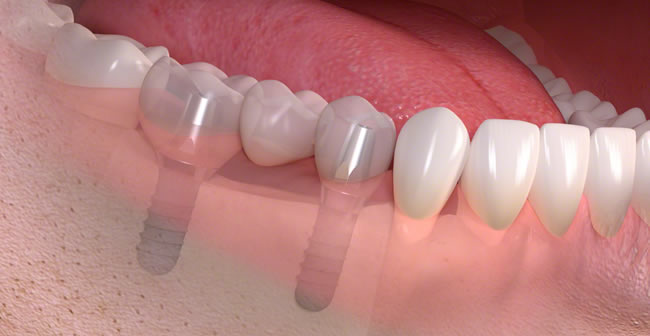Avoiding Problems With Dental Implants

Implants offer a great solution for missing teeth but problems can arise if you don’t look after them.
Dental implants are a highly successful and popular way of replacing missing teeth. Given that they do require minor surgery, it is perhaps not surprising to know that although the success rate is very high, problems can occur after they have been placed. Generally, this won’t happen and most people will enjoy a straightforward journey towards having a new tooth, but it is important to be aware so that precautions can be taken to minimise any risk.
In today’s blog, we are going to look at some potential issues that our Canterbury patients could encounter, and what they can do to prevent them from arising.
Your initial care
Once your dental implant has been placed, the process of healing begins. This doesn’t just mean the healing of the ‘wound’ area but the integration between the implant and the bone in which it is placed. This process is known as osseointegration and is essential for a successful treatment. If the bone fails to secure the implant in place, it may well become loose and potentially come out.
Because of this risk, it is essential that you follow your dentist’s advice. You should do this for all stages, but this initial stage in particular due to the vulnerability of the implant at this point. You will need to take care with your diet which will initially include liquidised foods and then gradually introducing softer foods such as mashed potatoes. The key here is to not put any pressure on the implant that could cause the integration process to be compromised.
You will also need to take special care with cleaning of the implant area and you will be given full advice on this following your treatment at Bradley and Partners Dental & Implant Clinic here in Canterbury.
Periodontitis and peri-implantitis
Both during and after the initial stage, one of the biggest risks to your new dental implants is gum disease. This might surprise a few people who think that gum disease means perhaps sore gums and a little bleeding. While these are possible symptoms, the most serious of all is during the advanced stage of gum disease known as periodontitis. When this happens, it isn’t just the soft tissues of the gums that are affected but very often the bone too.
As bacteria works its way under the gum line and down the tooth root into the bone, it can start to weaken and damage the bone that is holding your implant in place. As this degrades, the implant could easily start to become loose, work its way from the bone and eventually fall out. Similarly, peri-implantitis affects the soft tissue including gums and ligaments which can come away from the tooth and start to threaten the implant.
It’s important to stop smoking if you currently do, as that is one of the biggest risk factors, but it’s also important to exercise a good level of general oral care too. This includes good quality brushing, ensuring that the bristles reach beneath the gum line to remove bacteria and food particles. Using dental floss once the implant is fully settled is also very important for cleaning areas a toothbrush won’t reach.
You should also not rely entirely on home cleaning, important though that is, and make sure that you have appointments at our Canterbury hygienist for a scale and polish procedure. This cleans away hardened bacteria called tartar which is a significant contributor to gum disease and therefore a potential risk to your implants too.
Early warning signs
Your new implant will be monitored to ensure that it remains healthy and this will continue with your regular six monthly check ups. This is usually sufficient to spot any early problems and to correct them in time. You should also be aware if any possible issues arise and make sure to contact us as soon as possible so that the problem is addressed as quickly as possible.
The following are some of the most likely warning signs but if there is anything that might be causing you concern with your implant, it is important that you get in touch with us straight away.
- Bleeding, sore or swollen gums
- Persistent bad breath (halitosis) or an unpleasant taste in the mouth
- If the implant doesn’t feel entirely stable
- If your bite feels different or not quite right
In any of these situations, or any other of concern, please contact us immediately.
The fact is that dental implants have an extremely high success rate in the high ninety percents and for most people, they provide a great replacement tooth that feels just like a natural one. Awareness of things that can go wrong is useful though as most issues can be avoided if caught in good time. For further information about teeth implants, or to arrange a consultation with us, please call Bradley and Partners Dental & Implant Clinic on 01227 463529.
